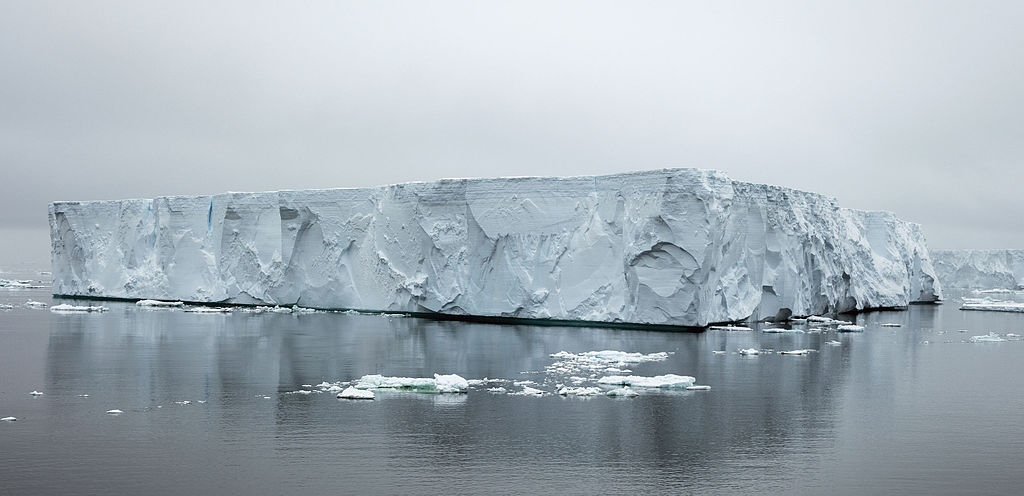Difference between revisions of "Template:Westarctica.wiki:Today's featured article"
Westarctica (talk | contribs) |
Westarctica (talk | contribs) |
||
| Line 1: | Line 1: | ||
[[File: | [[File:Antarctic Sound-2016-Iceberg 02.jpg|300px|left]] | ||
An '''[[iceberg]]''' is a large piece of freshwater [[ice]] that has broken off a [[glacier]] or an [[Ice-shelf|ice shelf]] and is floating freely in open water. It may subsequently become frozen into [[pack ice]] (one form of sea ice). As it drifts into shallower waters, it may come into contact with the seabed, a process referred to as seabed gouging by ice. About 90% of an iceberg is below the surface of the water. | |||
Because the density of pure [[ice]] is about 920 kg/m3, and that of seawater about 1025 kg/m3, typically about one-tenth of the volume of an iceberg is above water (which follows from Archimedes's Principle of buoyancy). The shape of the underwater portion can be difficult to judge by looking at the portion above the surface. This has led to the expression "tip of the iceberg", for a problem or difficulty that is only a small manifestation of a larger problem. | |||
Icebergs are monitored worldwide by the U.S. National Ice Center (NIC), established in 1995, which produces analyses and forecasts of Arctic, [[Antarctic]], Great Lakes and Chesapeake Bay ice conditions. More than 95% of the data used in its sea ice analyses are derived from the remote sensors on polar-orbiting satellites that survey these remote regions of the Earth. | |||
'''([[ | '''([[Iceberg|Full Article...]])''' | ||
Revision as of 19:40, 24 June 2019
An iceberg is a large piece of freshwater ice that has broken off a glacier or an ice shelf and is floating freely in open water. It may subsequently become frozen into pack ice (one form of sea ice). As it drifts into shallower waters, it may come into contact with the seabed, a process referred to as seabed gouging by ice. About 90% of an iceberg is below the surface of the water.
Because the density of pure ice is about 920 kg/m3, and that of seawater about 1025 kg/m3, typically about one-tenth of the volume of an iceberg is above water (which follows from Archimedes's Principle of buoyancy). The shape of the underwater portion can be difficult to judge by looking at the portion above the surface. This has led to the expression "tip of the iceberg", for a problem or difficulty that is only a small manifestation of a larger problem.
Icebergs are monitored worldwide by the U.S. National Ice Center (NIC), established in 1995, which produces analyses and forecasts of Arctic, Antarctic, Great Lakes and Chesapeake Bay ice conditions. More than 95% of the data used in its sea ice analyses are derived from the remote sensors on polar-orbiting satellites that survey these remote regions of the Earth.
